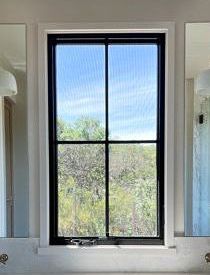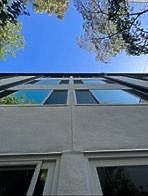
ALL ABOUT INSULATED GLASS
Have you noticed you look through your window and the view is foggy but outside it’s a beautiful
clear day? Have you noticed a milky streak that you’ve attempted to clean countless times and
nothing works? More than likely what you are experiencing is a failed insulated (dual pane)
glass unit. The lifespan of a typical unit is anywhere from 10 – 20 years. Our goal is always to
provide you with excellent customer service and all the information you need to make an
informed decision. Below you will find how an insulated glass unit is constructed and also why
can cause a unit to fail.
Construction of Insulated Glass Units (IGUs)
An Insulated Glass Unit (IGU), often referred to as double glazing or triple glazing, consists of
multiple panes of glass separated by a spacer to create a sealed cavity. This construction
improves thermal and sound insulation. Here is how they are typically constructed:
1. Glass Panes
- IGUs use two or more glass panes (e.g., clear, tinted, or Low-E coated glass).
- The panes are separated to create an insulating air or gas-filled space.
2. Spacer
- A spacer, usually made of aluminum or stainless steel, separates the panes and
maintains uniform spacing.
- It is filled with a desiccant material to absorb moisture and prevent condensation inside
the sealed space.
3. Sealant
- The spacer and glass edges are sealed using dual-seal systems:
- Primary Seal: Polyisobutylene (PIB) to prevent gas leakage and moisture ingress.
- Secondary Seal: Silicone or polysulfide for structural integrity and protection
against external elements.
4. Insulating Gas
- The cavity between the panes is filled with air or insulating gases like argon, krypton, or
xenon to enhance thermal performance.
5. Edge Treatment
- Some IGUs have Low-E coatings or films applied to one or more panes to improve
thermal efficiency by reflecting heat while allowing visible light to pass.

Why Insulated Glass Units Fail
Despite their durability, IGUs can fail over time due to various reasons. Common failure
mechanisms include:
1. Seal Failure
- Causes:
- UV radiation degrades the sealant over time.
- Thermal expansion and contraction stress the sealant.
- Poor installation or manufacturing defects.
- Effects:
- Moisture enters the cavity, causing fogging or condensation.
- The insulating gas escapes, reducing thermal efficiency.
2. Spacer Corrosion
- Metallic spacers can corrode if exposed to moisture, compromising the structural
integrity and seal.
3. Desiccant Saturation
- Over time, the desiccant in the spacer may become saturated with moisture, allowing
condensation inside the unit.
4. Thermal Stress
- Uneven heating and cooling of the glass can cause stress cracks, leading to seal failure
or breakage.
5. Mechanical Damage
- Impact or improper handling during installation or cleaning can damage the glass or
seals.
6. Poor Manufacturing
- Low-quality materials or poor workmanship can lead to improper sealing or weak
spacers, reducing the lifespan of the unit.
7. Age and Wear
- Over time, natural aging processes cause the materials to degrade, typically after 10–20
years.
Prevention and Mitigation
- Use high-quality materials and reputable manufacturers.
- Ensure proper installation with adequate allowances for expansion and contraction.
- Regularly inspect windows for early signs of seal degradation or fogging.
- Opt for modern IGUs with advanced sealants, warm-edge spacers, and high-
performance coatings for longevity.
Most customers think that it is going to be a huge expense or that they have to change out the
entire window, 90% of the time this is not the case. Changing a unit is typically quick and less
invasive to your living or work space. Give us a call or send us an email and one of our
experienced Project Managers can provide you with an estimate.
Golden West Glass --- Serving the North Bay Since 1978


Share On: